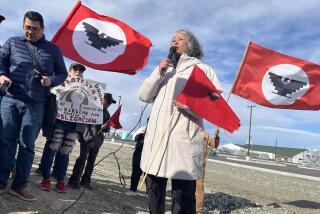S. Africa Union Urges Foreign Pullout, Curbs
- Share via
JOHANNESBURG, South Africa — The largest South African labor federation called Saturday for the withdrawal of all foreign companies operating here and for the imposition of comprehensive economic sanctions against this country in an effort to hasten the end of apartheid.
The Congress of South African Trade Unions, most of whose 712,000 members are black, voted overwhelmingly--despite the possible loss of jobs--for the much tougher international measures in the belief that only mandatory sanctions are likely to put enough pressure on the country’s whites to accept a system of majority rule.
“We support disinvestment because it is one of the few remaining nonviolent means to end apartheid and the civil conflict in our country,” Jay Naidoo, the federation’s general secretary, told reporters at the end of its four-day national convention. “We are faced with a choice of disinvestment and sanctions, or settling for something that allows the apartheid regime to continue indefinitely. . . .
‘Nonviolent Means’
“Disinvestment to us means the complete withdrawal of all foreign companies, and comprehensive and mandatory sanctions mean the end of all forms of operation by big companies in South Africa and of all trade with South Africa.”
The federation’s action comes amid reviews in the United States, the European Communities and the Commonwealth of earlier sanctions against South Africa, including bans on new investment, limitations on trade and restrictions on technology transfer, and the consideration of further international steps.
Naidoo said the labor body would seek support abroad from other trade unions and anti-apartheid campaigners to force more American and European companies to end their operations here and for a cutoff of bank loans and credit to South Africa, a boycott of its gold, diamonds, platinum and coal exports, a ban on foreign travel by South African businessmen, officials and even tourists, prohibition on immigration by South Africans, withdrawal of landing and overflight rights for South African Airways and the further diplomatic isolation of Pretoria.
Could Cost Many Jobs
Elijah Barayi, president of the federation, known as COSATU, said the 1,450 delegates to the convention recognized that such moves could cost its members and other blacks their jobs, but felt that much stronger measures were necessary as part of their fight to end apartheid, this country’s system of racial separation and minority white rule.
“We don’t accept such questions as, ‘What are you going to do if your members are not working?’ ” said Chris Dlamini, federation vice president. “That is our problem as South Africans and as workers.”
But Naidoo also called upon foreign companies quitting South Africa to negotiate the terms of their withdrawal--future ownership, disposal of assets, pension guarantees, severance pay--with their workers, not just the white South African management that generally takes over the local subsidiary.
The announced withdrawals by most of the more than 100 American and European companies that have left South Africa in the past year and a half are “nothing more than corporate camouflage that allows the companies to continue working with the Pretoria regime,” Naidoo declared. “What we are saying is that multinational disinvestment must comply with the demands made by the workers of South Africa.”
‘Social Responsibility’
This long series of “management buyouts,” according to a COSATU study, have generally put white South African managers in charge, preserved the market share of the American or European parent through the new South African company, freed the new firm from previous corporate requirements of “social responsibility” and even allowed activities, such as arms sales, that were previously prohibited.
“Capitalists have been supportive of the apartheid regime’s policies and remain the state’s most trusted partner in maintaining oppression and exploitation,” COSATU declared, rejecting the usual argument of big business here that it is a major and progressive force for political change.
In the country’s continuing civil unrest, police in Cape Town used tear gas to disperse mourners they said were turning the funeral of a member of the outlawed African National Congress into an anti-government rally.
Two men, believed to be African National Congress guerrillas, were killed on Saturday in the nominally independent tribal homeland of Bophuthatswana while apparently trying to plant a land mine on a road near the village of Jericho, about 35 miles northwest of Pretoria.
More to Read
Sign up for Essential California
The most important California stories and recommendations in your inbox every morning.
You may occasionally receive promotional content from the Los Angeles Times.













